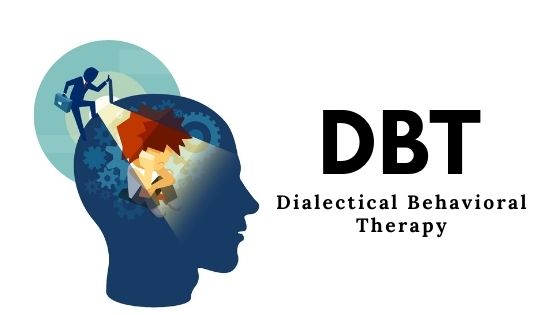Changing Lives: DBT London's Holistic Technique to Recovery
Changing Lives: DBT London's Holistic Technique to Recovery
Blog Article
Using the Power of Dialectical Behavior Therapy (DBT) Services for Sustainable Psychological Equilibrium and Improved Relationships
In a globe where psychological health and preserving healthy partnerships are vital parts of a satisfying life, the use of Dialectical Behavior Therapy (DBT) solutions has become a beacon of wish for many people. The organized and evidence-based approach of DBT supplies a path towards lasting emotional balance and improved communications with others. By focusing on core principles, people can develop necessary abilities for regulating emotions, enhancing interpersonal effectiveness, and promoting mindfulness. The true power of DBT lies not just in understanding these ideas but in the sensible application of strategies in day-to-day life. As we navigate the intricacies of human feelings and relationships, taking advantage of the potential of DBT services becomes a transformative trip worth discovering better.

Understanding the Core Concepts of DBT
Dialectical Actions Treatment (DBT) is started upon a set of core concepts that underpin its healing technique to advertising emotional equilibrium and mental health. Mindfulness is another core concept of DBT, focusing on being totally present in the moment without judgment.

Recognition is also integral to DBT, emphasizing the importance of acknowledging and approving one's experiences and feelings as valid. Through recognition, people can find out to navigate their sensations with compassion and understanding, cultivating self-acceptance and emotional development. Behaviorism plays an important function in DBT, emphasizing the modification of maladaptive actions via reinforcement and skill-building. By including these core principles right into treatment, DBT provides a efficient and comprehensive technique to advertising psychological well-being and emotional resilience.
Creating Emotional Policy Abilities
Psychological guideline skills are important elements of Dialectical Behavior modification (DBT) that make it possible for individuals to properly manage their feelings and browse tough circumstances with resilience. These abilities encompass the ability to recognize and understand one's emotions, tolerate distress, manage extreme sensations, and act based on personal values even in the face of emotional chaos. Developing emotional guideline skills involves learning mindfulness methods to remain present in the moment, recognizing the triggers that cause psychological dysregulation, and carrying out coping methods to modulate psychological actions.

Enhancing Interpersonal Performance
Improving interaction skills and fostering meaningful links with others are important facets of establishing interpersonal effectiveness within the structure of Dialectical Behavior modification (DBT) In DBT, improving social performance involves discovering exactly how to assertively share one's requirements and borders while additionally thinking about the needs and limits of others. This skill is important for minimizing and developing healthy relationships dispute. DBT instructs individuals just how to communicate effectively, browse social obstacles, and create strategies for resolving conflicts in a positive manner.
One key element of improving social effectiveness in DBT is discovering to acknowledge and take care of emotions in social interactions. DBT London. By enhancing emotional recognition, individuals can react to others in a much more understanding and understanding means. In addition, DBT highlights the relevance of exercising mindfulness in interpersonal relationships, urging people to be present in their communications and fully engage with others
Exercising Mindfulness Techniques
Creating a regular mindfulness practice is essential for individuals undergoing Dialectical Habits Treatment (DBT) to cultivate psychological law and enhance their social effectiveness. Mindfulness strategies, a core find this element of DBT, include taking notice of the here and now minute without judgment. With mindfulness, individuals can end up being a lot more aware of their thoughts, emotions, and bodily feelings, enabling them to reply to circumstances with greater clearness and control.
One key mindfulness method made use of in DBT is mindfulness reflection. This technique entails concentrating on the breath or a particular things while allowing and recognizing go of any kind of distracting thoughts. By integrating mindfulness meditation right into their everyday routine, individuals can educate their minds to stay present and decrease sensitivity to stress factors.
Another crucial element of exercising mindfulness in DBT is the principle of extreme approval. Radical acceptance includes completely embracing fact as it is, also when it is difficult or uncomfortable. By approving the here and now minute without judgment, people can decrease their suffering and make space for positive adjustment.
Applying DBT Methods in Life
Building upon the foundation of mindfulness strategies such as reflection and radical approval, individuals can integrate DBT methods right into their day-to-day lives to foster psychological balance and enhance their social skills. In addition, interpersonal performance abilities showed in DBT can help people interact their needs assertively, set boundaries, and maintain healthy partnerships. By consistently using these DBT methods in daily life, individuals can experience sustainable psychological equilibrium and improve their general well-being.
Final Thought

Emotional regulation skills are vital components of Dialectical Actions Therapy (DBT) that enable individuals to efficiently handle their feelings and browse tough situations with durability.Through DBT services, look at here now people can grow a much deeper recognition of their feelings, acknowledge patterns of actions that contribute to psychological distress, and acquire practical devices to control their sensations constructively.Establishing a consistent mindfulness practice is important for individuals undertaking Dialectical Behavior Therapy (DBT) to grow psychological regulation and boost their interpersonal efficiency.Structure upon the structure of mindfulness techniques such as reflection and radical approval, individuals can integrate DBT methods right into their everyday lives to foster psychological balance and boost their social skills. By understanding the core concepts of DBT, establishing psychological guideline abilities, enhancing social effectiveness, exercising mindfulness methods, and applying DBT methods in daily life, people can experience considerable improvements in their total well-being and relationships.
Report this page